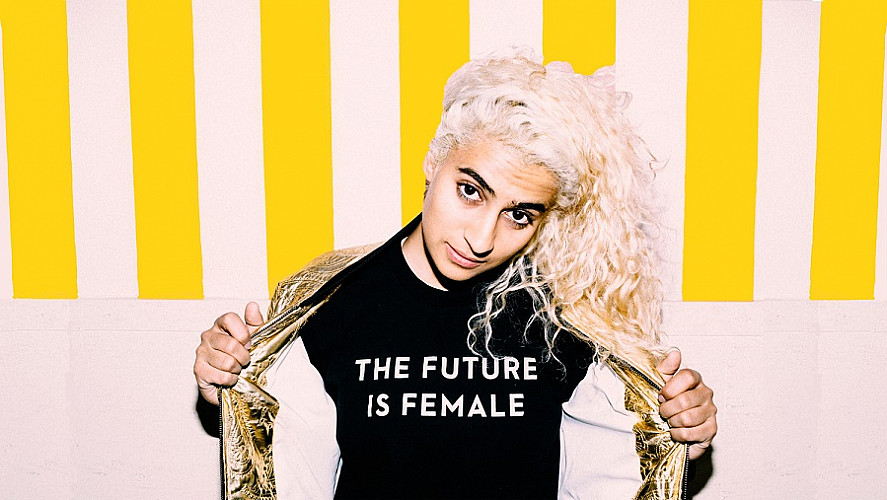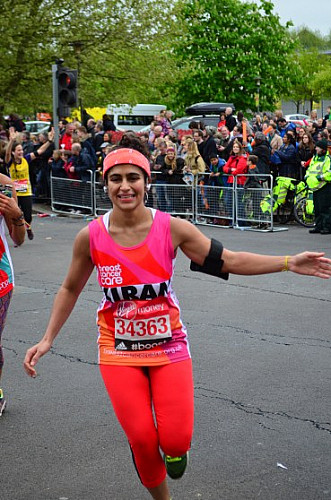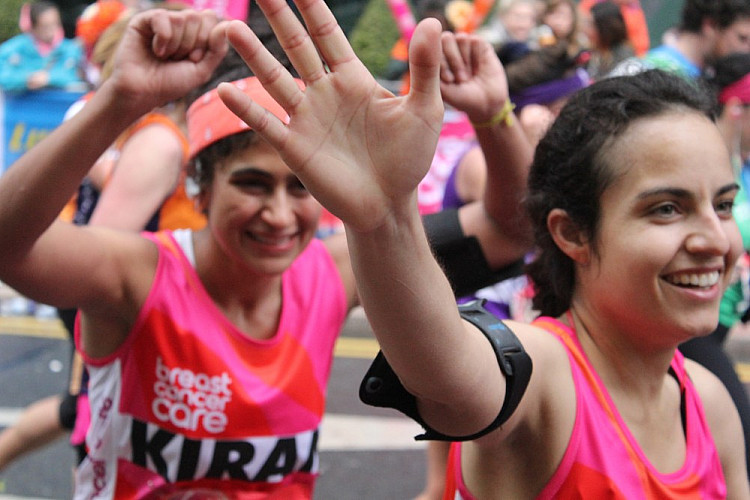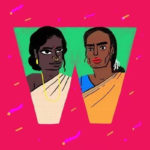The Female Gaze: Don’t Stop Running. People Are Watching
Kiran Gandhi is a Los Angeles-based musician who has toured professionally, drumming for M.I.A and Thievery Corporation. Her mission is to elevate and celebrate the female voice. She breathed life into this vision by running the London Marathon whilst on her period allowing the blood to flow freely down her legs.
I had been practising for the London marathon for a year and was as nervous as a first-time runner could be. The night before, I felt the familiar sensation of a cramp followed by some blood that I was not prepared for. I evaluated my options — picking between the chaffing of a sanitary napkin and the discomfort of a tampon. And so, the next morning, I decided to abandon both.
I proceeded to run 26.2 miles with blood running down my legs.
My courage came from the realisation that if there’s one person society won’t mess with, it’s a marathon runner. If there’s a way to transcend oppression, it’s to run a marathon in whatever way you deem appropriate. I did it for the sisters who don’t have access to tampons, and for the women who brush off their cramps and pretend that it doesn’t exist. I ran to say, it does exist, and we overcome it every day.
A period doesn’t fit into the ‘desirable’ category, so it is labelled as taboo.
Young women’s brains are ingrained with the false notion that their main contribution to society is being ‘desirable’. Parents have an awkward time discussing it with children. Period commercials are all about concealing your blood or saving yourself from embarrassment. In fact, advertisements don’t even show blood in a commercial about blood; they show a metaphorical blue liquid instead. Girls are taught from a very young age to exaggerate what society has deemed beautiful and to hide what is not sexually consumable, our periods being one of them. While I am not an advocate for free-bleeding, I am endorsing that it be acceptable for women to speak comfortably about menstruation, to ask for medicine and not have to pretend they have a stomach ache when they are experiencing cramps.
My marathon run was about reclaiming the fact that it is not my job to look sexy for public consumption.
Both Steve Jobs and Mark Zuckerberg, at some point in their careers, announced that the reason they wear the same outfit every day is so that they have one less decision to make which frees up their mental capacity to handle one more decision at the workplace. Women, on the other hand, go through the daily grind of having to worry about their hair, makeup, weight, clothing, shoes and general desirability instead of being given the freedom to just get on with their lives. My job on the marathon course was about choosing what was right for me in that moment, and completing the 26.2 mile race in the safest and healthiest way possible for my body without being bogged down by the dictums of society.
Menstruation stigma is only one of many systemic factors that perpetuate gender inequality, and one that we frequently ignore.
There was a lot to chew on as I steadily made my way towards the finish line. I drew a parallel between women’s economic oppression and period stigma. Here’s how the pattern established itself in my head: girls are advised against talking about menstruation. Society goes through great lengths to make it expensive and unsustainable to actually conceal it — pads are a luxury for most rural communities and tampons are not a practical solution for societies that are protective of a woman’s virginity. Eventually, most girls end up just staying at home when on their period, missing school and growing up feeling shameful of their bodies. They don’t graduate with the same education and opportunities as boys do, and are put at both an economic and emotional disadvantage; if you feel you don’t have any power, you will act like you don’t. My run was about using shock factor to create dialogue around menstrual health and comfort, so that women could own the narrative of their own bodies.
It was about feminism and family.
I ran with two of the most important women in my life — Ana and Mere, and we didn’t leave each other’s side, from start to finish. We ran the whole way without stopping and crossed the finish line hand-in-hand, raising 6000 dollars for Breast Cancer Care. What also boosted my morale were the packed sidelines, people running with tutus, without shoes and some even lugging 40 pounds on their back. The strength to take this bold step was also derived from the unwavering support of my father and brother who made cheer t-shirts and wore them to the breast cancer cheer points at miles 9 and 18.5. Ana’s mom and sister were there too and supported us with screams and hugs throughout the race.
Speaking about an issue is the only way to combat its silence.
I walked away from this experience knowing that being there for someone in a totally selfless way can carry them through a difficult time. Dialogue is the only way for innovative solutions to occur. I could never have expected the international viral reaction that resulted online several months after my race.This taught me two things: that period stigma runs deep and that we have a lot of work to do as a society to build together a world that is more loving and inclusive of women’s bodies.
Related posts from Verve:
Verve Trending
Sorry. No data so far.
us on Facebook to stay updated with the latest trends








